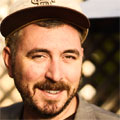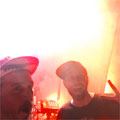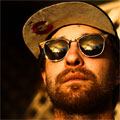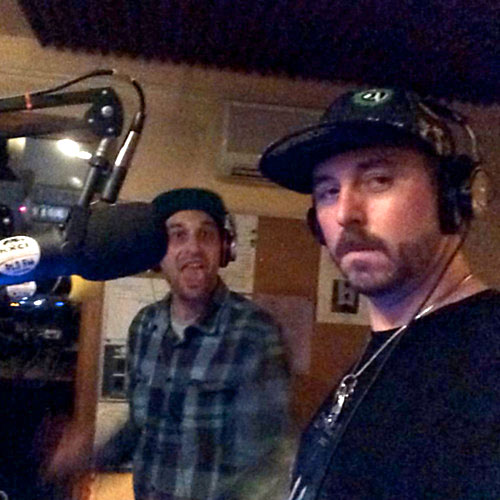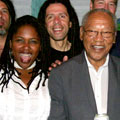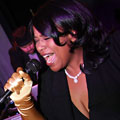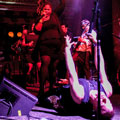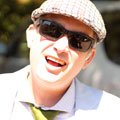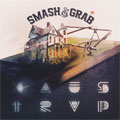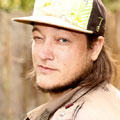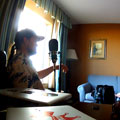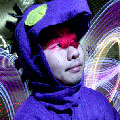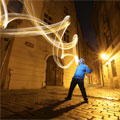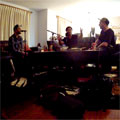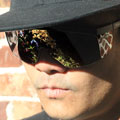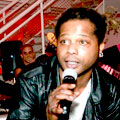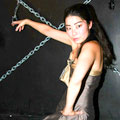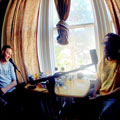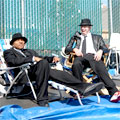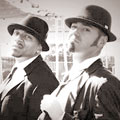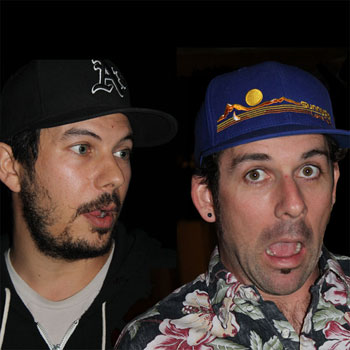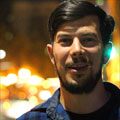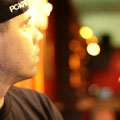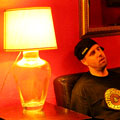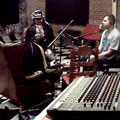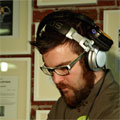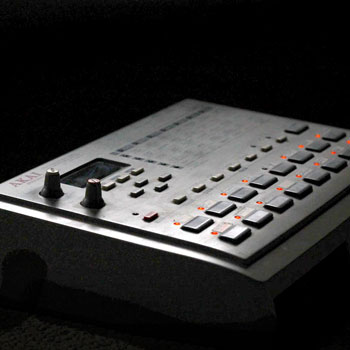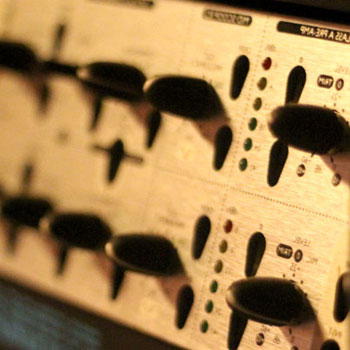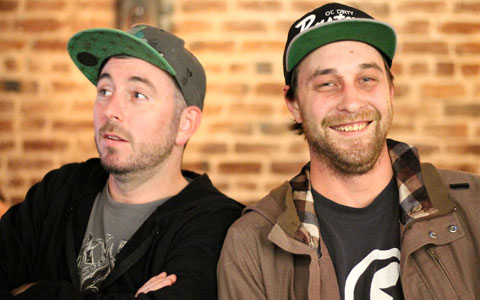SEASON 2:
 Audio Angel
Audio Angel
 Smash & Grab
Smash & Grab
 Mochipet
Mochipet
SEASON 1:
 Citizen Ten
Citizen Ten
 DJ Enki
DJ Enki
 OG Krush
OG Krush
 Swapmeet Ensemble
Swapmeet Ensemble
 Matt Haze
Matt Haze
 Joji Starr
Joji Starr



SEASON 1:






AUDIO ANGEL ON REDEFINING 'EASY':
JTONAL: I really respect what you do, one of the reasons is because you can make a living from music and from your voice, and I don't think it's easy at all. A lot of the stuff that you do with your voice other than music is for voice over and...
AUDIO ANGEL: Yeah, commercial work. It's interesting that you say that you don't think it's easy, because I think that that's the number one thing I want to always get across to anyone who's interested in using their art for their livelihood. I've had to constantly, perpetually tune my own awareness about what 'easy' is and what it is that I want to believe that I can have it. Period. I'll tell people on a plane what I do, and their like "What's your day job?" I'm like: "This is my job" and that's fine that you think that I have another job, or that you think that I might need another job, that's ok. It's what I think. I really have to preach it to myself, I have to advertise it to myself. You see it around my room, it says "Don't think" back there- don't get caught up in the bullshit. That's why I've got to do this for the last 17 years.
JTONAL: I really respect what you do, one of the reasons is because you can make a living from music and from your voice, and I don't think it's easy at all. A lot of the stuff that you do with your voice other than music is for voice over and...
AUDIO ANGEL: Yeah, commercial work. It's interesting that you say that you don't think it's easy, because I think that that's the number one thing I want to always get across to anyone who's interested in using their art for their livelihood. I've had to constantly, perpetually tune my own awareness about what 'easy' is and what it is that I want to believe that I can have it. Period. I'll tell people on a plane what I do, and their like "What's your day job?" I'm like: "This is my job" and that's fine that you think that I have another job, or that you think that I might need another job, that's ok. It's what I think. I really have to preach it to myself, I have to advertise it to myself. You see it around my room, it says "Don't think" back there- don't get caught up in the bullshit. That's why I've got to do this for the last 17 years.
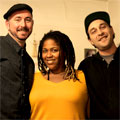 WE CHILLED WITH AUDIO ANGEL IN OAKLAND:
WE CHILLED WITH AUDIO ANGEL IN OAKLAND: The Bay Area's own Audio Angel invited us to her home and recording studio in Oakland recently and we talked about making a living off your art, being in the Walking Dead video game, and plays some of her new tracks for us.
Check out Audio Angel on screen ParkingTicket: CSN Promo f/ Rashida Clendening & John Burbank
 THE SIGNAL JOCKS TRAVELED TO TUCSON AZ:
THE SIGNAL JOCKS TRAVELED TO TUCSON AZ: Signal Jocks J.Tonal and Life 1 recently winged out to Tucson to cover the Gem & Jam Festival. While out there, Life 1 was able to guest-star with J.Tonal in several Flying Skulls MPC performances, one at the festival itself, and one on a great community radio station KXCI. For this episode, we've pulled together some of the on-the-spot coverage we did of the festival, as well as the KXCI interview and performance from a radio show called Electric Feel hosted by Corbin Dooley.
J.TONAL ON PERFORMING WITH AN AKAI MPC 1000:
CORBIN DOOLEY: For the people who are just joining us, talk little bit about what you're doing live in the studio.
J.TONAL: Yeah well we're trying to bring more of the idea of improvisation into electronic music. I appreciate everybody who's making the music, the producers who get up there and travel across country and bring their music. For us, we demand something more, and that's to have some element of danger there. As you can tell once you start playing, you're pretty much locked in, there's no artifice or anything to hide behind. So that's part of what makes it interesting.
CORBIN DOOLEY: I really noticed what you guys are doing with these a Akai drum machines. You've put the different sounds on the pads, but playing them is a real art... because you really can! There's a lot of times where your finger could slip off, just like a drummer, just like a pianist, or like a guitar player. It's a really innovative way to present electronic music.
 WE CHILLED WITH SMASH & GRAB IN TUCSON:
WE CHILLED WITH SMASH & GRAB IN TUCSON: We caught up with Smash & Grab before their set with LTJ Bukem to kick off the 9th annual Gem & Jam Festival in Tucson Arizona. We chatted about their lack of a flight, their new album HAUS TRVP, and their perspective being artists while working for large music corporations.
SMASH & GRAB ON TRAVELING TO SHOWS:
JTONAL: I heard there was a plane delay, an overbooking, and perhaps maybe they even put you on the bus to get from Phoenix to Tucson?
RIBOTTO: That’s correct Jeff. When we arrived at our gate, we actually ran to the gate because it was a very close connection, and there was no airplane. Then the airplane that they provided had a 30 less seats than passengers. They graciously offered us a luxury bus ride through the desert... which is beautiful this time of year.
JTONAL: Was there a negotiation? Did they say you could take this bus ride or…
RIBOTTO: Let me tell you about the negotiation that happened. As a very unsatisfied customer I approached the customer service desk and they're like, ‘We're going to give you this $200 voucher to fly on US Airways again,' and I was like, 'I don't ever want to fly on your airline ever again, so this is pretty much useless to me. How do I get a refund?' and they're like, ‘Well... we can give you a refund but we're going to cancel your flight, (including our flight home) and we're not gonna put you on the bus to Tucson.' They drew a very hard line in the sand, they were basically like hostage negotiators...
LIFE1: What is the technical term for it? Got you by the short hairs?
RIBOTTO: Yeah, they 'bent us over in the back shed.’
JEROME FORNEY: Basically they gave us directions to grab one cheek and then the other cheek and just pull apart... You know the rest.
LIFE1: One thing to interject here is that I heard that they also took away your boarding passes away from you at the gate.
RIBOTTO: We were wandering through the airport like ghosts without boarding passes. If security had approached us at any point and said, ‘Hey what are you doing here?' we would literally have no answer for that.
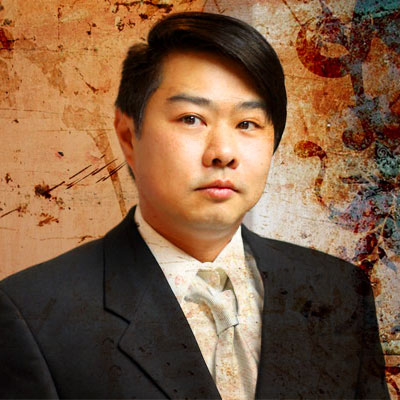 WE CHATTED WITH MOCHIPET IN HUNTER'S POINT:
WE CHATTED WITH MOCHIPET IN HUNTER'S POINT: We cruised over to Hunter's Point to meet up with Mochipet in at his dino-pad to talk about what's expected of music artists in the 21st century, his new album Psilocybin Samurai, $50 tee-shirts, and making a living in the music industry.
MOCHIPET ON MAKING A LIVING IN MUSIC:
MOCHIPET: "It's hard to force people to pay for music these days. You kind of have to give it away for free and hopefully if they like it they will donate, or come to your shows."
JTONAL: "Do you do a name your price approach?"
MOCHIPET: "Yeah I do a name your price, so people just download it. I figure it's better that way than them going to some torrent site and downloading it for free anyway."
JTONAL: "So that's like the loss leader to get booked and go play shows?"
MOCHIPET: "Yeah, I think most artists now, they make a living off playing shows."
JTONAL: "Which is what we expected when the record labels dissolved, right? Because what was left was performance. People will still pay to see performance."
MOCHIPET: "Right, people will still pay to see performance... and you see a rise in vinyl, a lot of people buying vinyl records for physical, merch of course... merch is kind of ridiculous. I saw a Macklemore shirt it was like $50, it was just one color, it was white it said Macklemore on it, it didn't have a drawing it just said Macklemore! It was $50! $50, really? That's crazy but people got to make their money back I guess, they've got to figure some way to recoup."
JTONAL: "Because the music is free."
MOCHIPET: "Yep, because the music is free."
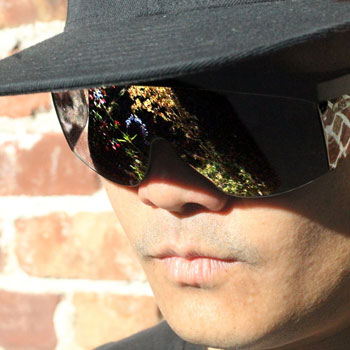 WE RAPPED WITH JUSTIN SMITH IN ALBANY:
WE RAPPED WITH JUSTIN SMITH IN ALBANY: J.Tonal and Life 1 caught up with Citizen Ten AKA The Zap Tap in Albany and chatted about aliases, performance art, the East Bay, and the merits of pouring milk on naked women at rock shows. He spit an a cappella, he spit on top of J.Tonal's MPC finger drumming, he also kicked down a peek at his new mix!!!
JUSTIN SMITH ON NAVIGATING FORMS OF EXPRESSION:
"I always saw myself as a producer, I've played musical instruments since I was 2 years old... that's never been a question to me. When I approached this culture of music, beats, whatever you call it, it was more like: 'What can I contribute as a producer.' At a certain point (I'll blame finances and necessity) DJing became a more viable option and a quicker fast-track to point B, whereas production took more time investment, it's pro-bono, this and that, but I can DJ at any club. At a certain point, I'm no longer playing my music, I'm DJing, and then there's the mild–and I mean mild–accolades for DJing, so now there's an artistic void, and it's like: I'm not producing, so what am I going to do? But I've always been rapping, and it's is an original thing, there is no sample-clearing, etc, but the big thing was: the shit I'm trying to DJ happens to be the shit I'm trying to rap on, so I could be DJing other-people's music, or I could be rapping on everybody's music."
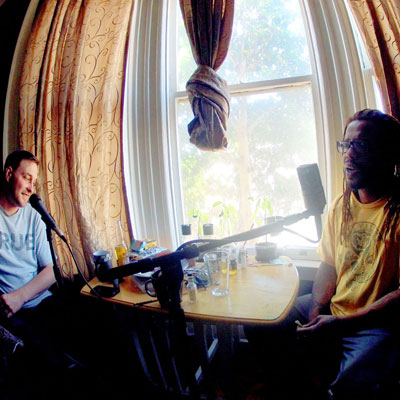 WE SAT DOWN WITH JOJI STARR IN SF:
WE SAT DOWN WITH JOJI STARR IN SF: The Signal Jocks crew brought the mobile studio out to Joji Starr's work space on Oak Street in San Francisco. Joji talks about how growing up in Harlem hearing his uncle play trumpet in the Mariachi leads to playing on the Warp Tour, and eventually out the other side of music into fashion and design.
JOJI STARR ON GROWING UP IN HARLEM:
"I’m from the East Coast. I’m from New York City, Harlem, 140th and Amsterdam, shake it down. That’s where I grew up, and if you don’t know where that is folks, that’s called Sugar Hill. That place where I lived, 140th & Amsterdam, is a historic spot. My family has been there over four generations. Music. Langston Hughes. Everybody. Jazz popped out of it. It used to be the center of the whole world at one point. That’s where I was birthed out from, so music is like, music and art and poetry, all this stuff is things that I immediately grew up with, it was the creative energy that flowed.”
JOJI STARR ON MOVING FROM MUSIC TO FASHION:
"In 2000 I was playing in a band on Warp Tour and I got to meet all my heroes, I met Long Beach Dub All-Stars, Jurassic 5, Chali 2na, when they first started, Pennywise, NOFX? I'm a big fan of punk? this was an amazing thing for me. I loved Sublime and this was a year after Bradly dies, that's why the All-Stars were out, and I got to meet heroes of mine, Bud and Eric. I'm talking to them and I'm like, 'How's life after, you know, how are you guys doing,' giving my condolences and they are saying some real stuff like 'It hasn't been the same, fanbase is down, it's a hard life on the road,' and as I'm sitting there at this Warp Tour show, I realize something about me. If I stay in the music business at this point, it was chewing up musicians at this point... we were already fucked up, everybody was fucked up... I got out because I figured I didn't want to get chewed up, the whole reason I got into the arts was to be unrestrained, I need full creative control."
 WE CAUGHT UP WITH THE SWAPMEET ENSEMBLE IN ALAMEDA:
WE CAUGHT UP WITH THE SWAPMEET ENSEMBLE IN ALAMEDA: Signal Jocks own J.Tonal and Life 1 hit up the members of the Swapmeet Ensemble in Alameda. Poach Stevens and Silence Damaal talk about balancing a music career with a family, plus drop some live bars over J.Tonal's MPC2500 finger drumming.
THE SWAP MEET ENSEMBLE ON BALANCE:
J.TONAL:"How do touring musicians deal with having a family? How do you come to a balance between your home life and music career?"
POACH STEVENS: "Now when it comes to balance, there is no balance, my kids are first. Honestly that permeates the shit out of my music. Because if you listen to my music I talk about family and being a father so goddamn much, because it's such an important part of my life. That's just my opinion and I could be going down the wrong route, of course that's what a marketing executive would say. I come from a very organic place, I am always making music, but really there is no balance. I deal with my wife and my kids first and then I deal with me, and me is music."
SILENCE DAMAAL: "It is a balance man. I'm not an expert on it, I'm still trying to figure out how to balance it, and how it influences work. One of our favorite songs is this joint called 'The Goods' and it's strictly about family, living in these small moments, like how these small moments are just everything."
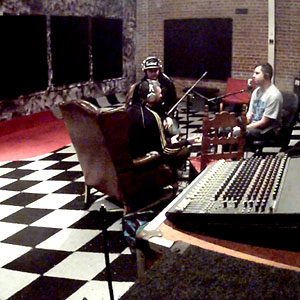 WE CHILLED WITH DJ ENKI OF THE OAKLAND FADERS:
WE CHILLED WITH DJ ENKI OF THE OAKLAND FADERS: The SJR crew had a late night meeting with DJ Enki at Soundwave Studios in West Oakland to talk about 'The Town', The 45 Sessions, Apache, the Incredible Bongo Band, and Cassette Tapes.
DJ ENKI ON THE 45 SESSIONS AND 45s:
JTONAL: "The 45 Sessions has been experiencing a lot of success lately... what would I see if I happen to stumble by one of these parties?"
DJ ENKI: "You would see DJs legitimately enjoying themselves with what they're doing. The 45 Sessions is our chance to really geek out and play the music that we love, that we don't necessarily get to play in a more clubby setting. It's much more just do what you do with the records that you really dig."
JTONAL: "When we say 45s, we're talking about 45 RPMs, right?"
DJ ENKI: "Strictly 7-inches."
JTONAL: "The small guys."
LIFE 1: "Vinyl records people! That is a whole other treat about going to one of these shows, you actually get to see real DJs at work, they're not staring at a screen..."
DJ ENKI: "Nope. We're not checking our email."
LIFE 1: "They're not like: Oh, oh, gotta Facebook this, gotta tweet this, got a drop coming, oh! No, none of that. It's real DJs, real digging, real music."
JTONAL: "Would you say that some of the vibe of the 45 Sessions is rooted in the past? Since 45s are from the past and so much great music only was pressed to 45s?"
DJ ENKi: "Oh for sure. The vast majority of the music that gets played there is old music because there's not a lot of 45s being pressed these days. There are more than there used to be, which is really cool, but you're mostly talking about stuff from the 60, 70s, on into the 80s but by the time you get into the 90s the 45s are getting pretty scarce."
 WE LINKED UP WITH WITH MATT HAZE OF THE SLAYERS CLUB:
WE LINKED UP WITH WITH MATT HAZE OF THE SLAYERS CLUB: The SJR crew caught up to Matt Haze at one of his many appearances in San Francisco. Recorded backstage at 1015 Folsom at a Euphonic Conceptions Gem & Jam pre-party. Matt talks about growing up in The Bronx, how DJing can be an act of selflessness, and about being a part of a collective.
MATT HAZE ON BLUE COLLAR DJS:
"You can call me a blue-collar DJ, I'm fine with that. You know, I make almost a living wage as a professional DJ and I'm good with that. I do exactly what I want to do. I get up in the morning and it's music all day, it's a beautiful thing. I feel great about that, but really, I serve the customer. My job is customer service and I'm gonna use all the skills, all the knowledge that I have acquired over my 15 years plus of DJing, all the records that I've gotten to know over the time, all the secrets, all the little tricks, and I'm going to use everything in my arsenal to make sure that whoever it is on the dance floor that really needs to have that experience that night has an experience and is able to get through whatever shit they're working through. That's the most important thing. It's not about people coming up to me and telling me how great I am, or how they want to suck my dick or whatever, it's about the one dude out there- that one chick out there who's having a really hard time, and they really needed this tonight. That's why I am there and that's why I keep working to make myself a better DJ, better producer, and to push this art form forward."
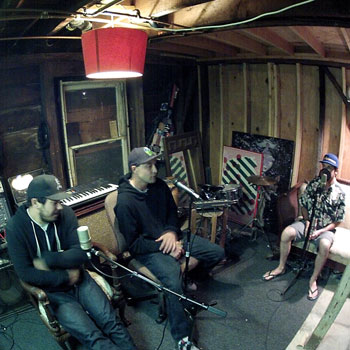 WE HUNG OUT WITH OG KRUSH IN WEST OAKLAND:
WE HUNG OUT WITH OG KRUSH IN WEST OAKLAND: The Signal Jocks crew hang out with the members of OG Krush in a studio in West Oakland, a new DnB offering from Vladimir Computin (Space Heater, Digidesign, Serrato) and Professor Bang (Slayers Club). They talk DnB, collaboration, and how they came to the realization that Jungle needed to make a comeback.
OG KRUSH ON THE FINER POINTS OF JUNGLE:
JTONAL: "So when you make Old-School Jungle, is it NEW Old School Jungle, or is it Old New-School Jungle?"
PROFESSOR BANG:"That's part of the amazing paradox that this project has created. When you tell people your making jungle some of them assume that you have somehow created a time machine and that you've gone back to London in the early 90's, but we're not really trying to be retro, as much as we trying to make more of a good thing."
PROFESSOR BANG:"I remember walking into parties out here in Oakland... I went to a lot of raves in Oakland back in the 90's.
LIFE1: "Home Base!!!"
PROFESSOR BANG:"Fucking-A right!! I loved the fact that you could dance as fast or as slow as you wanted in the jungle room."
LIFE1: "It was the spot for the real hyped up kids frying their balls off and the straight-up potheads that wanted to smoked weed all night long and just chill and groove. I mean, to find that groove either way..."
VLADIMIR COMPUTIN: "Totally, it's so polyrhythmic that you can nod to it at half-time, or you can try to dance to it at full-speed, or you can definitely dance to it at full-speed and go buck-wild."
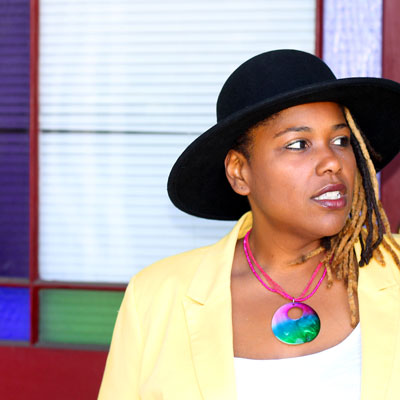 WE HUNG OUT WITH AUDIO ANGEL IN OAKLAND:
WE HUNG OUT WITH AUDIO ANGEL IN OAKLAND: The Bay Area's own Audio Angel invited us to her home and recording studio in Oakland recently and we talked about making a living off your art, being in the Walking Dead video game, and plays some of her new tracks for us.
AUDIO ANGEL ON REDEFINING 'EASY':
JTONAL: I really respect what you do, one of the reasons is because you can make a living from music and from your voice, and I don't think it's easy at all. A lot of the stuff that you do with your voice other than music is for voice over and...
AUDIO ANGEL: Yeah, commercial work. It's interesting that you say that you don't think it's easy, because I think that that's the number one thing I want to always get across to anyone who's interested in using their art for their livelihood. I've had to constantly, perpetually tune my own awareness about what 'easy' is and what it is that I want to believe that I can have it. Period. I'll tell people on a plane what I do, and their like "What's your day job?" I'm like: "This is my job" and that's fine that you think that I have another job, or that you think that I might need another job, that's ok. It's what I think. I really have to preach it to myself, I have to advertise it to myself. You see it around my room, it says "Don't think" back there- don't get caught up in the bullshit. That's why I've got to do this for the last 17 years.






